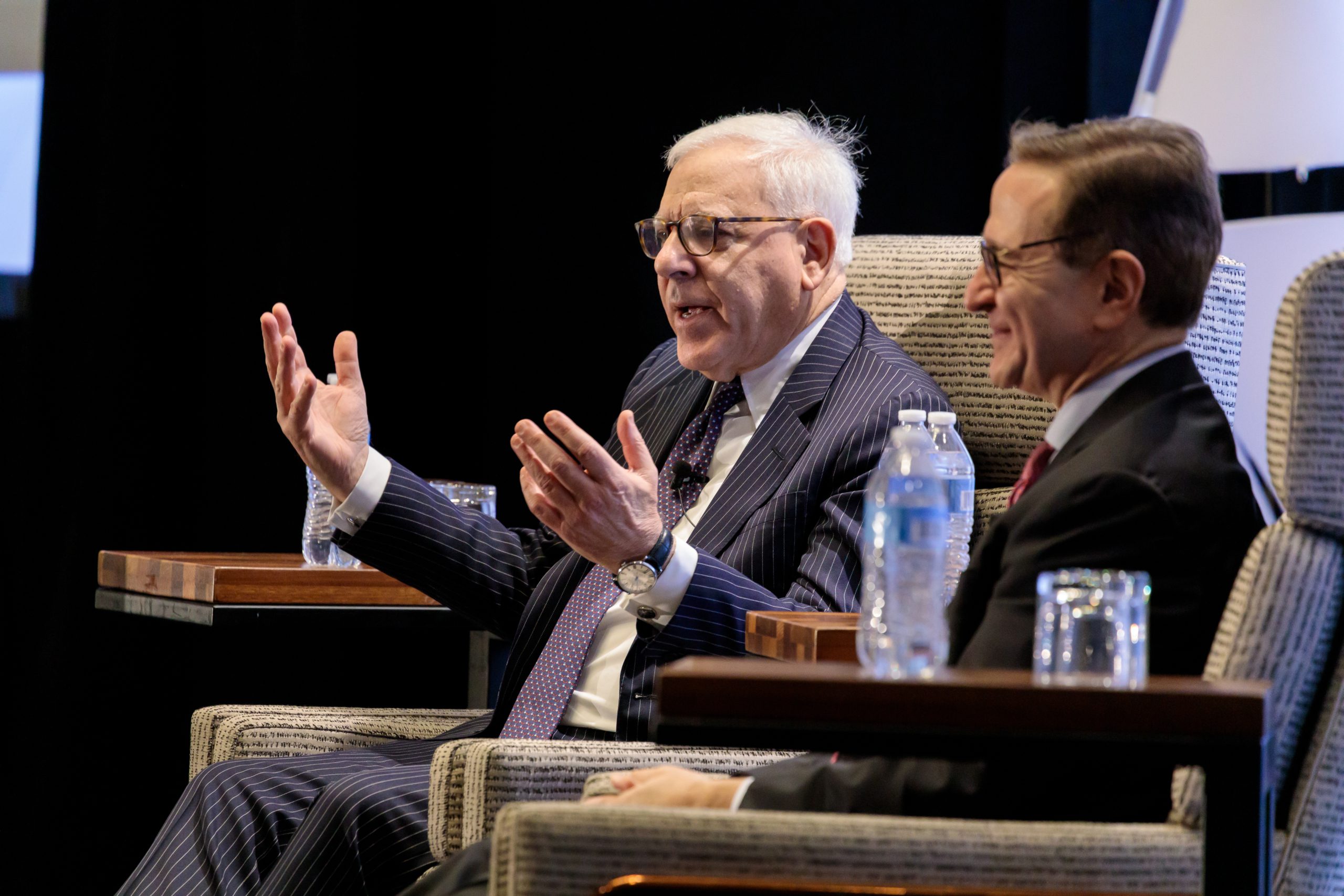Private Equity Conference Spotlights Industry Uncertainty

The Polsky Center hosted the 22nd annual BPOC Private Equity Conference February 3, 2023, at the Chicago Marriott Downtown. Keynote speaker David Rubenstein, JD ’73 (left) was joined in conversation with UChicago Professor Steve Kaplan (right). (Photo by John Zich.)
Speakers from throughout the industry recently gathered to discuss the challenges – and opportunities at the 22nd BPOC Private Equity Conference.
When David Rubenstein JD ’73 appeared on stage, the Carlyle Group cofounder and co-chairman of the board had plenty of advice for those looking to succeed in the private equity industry. Learning how to work with people, and sharing in both the wins and failures is often the key to success, he told an audience comprised of students, alumni, and other industry professionals.
The keynote speaker, in conversation with Neubauer Family Distinguished Service Professor of Entrepreneurship and Finance at the University of Chicago Booth School of Business and Kessenich E.P. Faculty Director of the Polsky Center, Steven Kaplan, was one of many experts reflecting on the private equity landscape, opportunities to work in the industry and the need to reevaluate strategies given the economic turmoil and inflation of recent months.
Panels, including Opportunities & Challenges for Private Equity in an Uncertain Economy, the Changing Transaction Technology and the Impact to the Private Equity Landscape, and Technology Investing in a Challenging Growth Environment, gave attendees a new perspective on what today’s economic uncertainty means for the private equity industry and areas they could expect to see growth in the decade ahead. The daylong conference, organized by the Chicago Booth Private Equity Group and the Polsky Center for Entrepreneurship and Innovation, had more than 30 speakers from all areas of the industry.
Here are key takeaways from the event:
// Industry evolution is inevitable
Even though the industry has outperformed the S&P every year since 1995, growth may slow in the coming years. For conference participants that means there are both risks and opportunities in the decade ahead. Many believe that the overall outlook is bright, with more pension funds and others increasingly making PE investments and looking at these investments as a way to diversify from the volatility of the public markets.
// Expect slower deal flow and longer pipelines
In general, firms are experiencing slower deal flow with some companies choosing to wait and time their exit to more favorable conditions. In addition to private equity firms waiting to exit, some founders are also waiting for a more favorable time to monetize their business. But even with longer pipelines, there are plenty of private equity assets with the need to transact, panel participants said. That means some firms are focused on value creation to improve the performance of their portfolio companies before selling, while others will encounter owners still eager to sell despite valuations not being at their peak from early 2022. Some mentioned a greater focus on additional value creation and completing strategic add-ons. Others are seeking out opportunities from multi-generational business owners eager to sell their companies.
// Family offices are playing a bigger role
As the industry evolves, family offices are expanding the industry by conducting deals directly. In the past, many would work with private equity firms rather than taking direct stakes in the companies. As bigger players in the industry, family offices will increase the competition for deals, particularly in the lower-middle market.
// Portfolio company employees find more equity opportunities
Some firms are moving past giving just the top management of their portfolio companies significant equity and expanding the financial opportunities to other employees. Proponents say new structures help to further engage workers across the entire company and cut down on turnover. And there’s evidence that some of these financial incentives are improving business, especially in industrials.
// Differentiate yourself to find career success
For those just starting out in private equity—or hoping to switch careers and get their foot in the door—Joanna Reiss, partner and co-head of Impact at Apollo Global Management had some advice: Start by understanding how your previous non-industry experience can help you stand apart from others with similar career goals, especially in a competitive industry like private equity. It’s a strategy that Reiss used when leveraging the investment banking experience she had earlier in her career.
Interested in more? The Polsky Center offers several hands-on learning opportunities aimed at helping students, researchers, faculty, and community members pursue their own entrepreneurial endeavors or careers in private equity, venture, capital, entrepreneurship through acquisition, or social entrepreneurship. Don’t miss out on a wide variety of experiential learning-based programs, events, workshops, speakers, panels, conferences, challenges, and more. Learn more about the Polsky Center’s private equity programs and educational resources >>